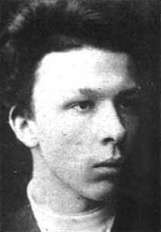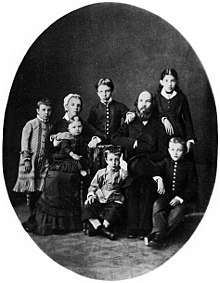Aleksandr Ulyanov
| Aleksandr Ulyanov | |
|---|---|
 | |
| Born |
12 April 1866 Nizhny Novgorod, Nizhny Novgorod Governorate, Russian Empire |
| Died |
20 May 1887 (aged 21) Shlisselburg, Russian Empire |
| Occupation | Communist political activist |

Aleksandr Ilyich Ulyanov (April 12, 1866 – May 20, 1887) [1] was a Russian revolutionary and older brother to Vladimir Lenin. He is also referred to as Sasha, a common diminutive form of the name Alexander.[2]
Life
Ulyanov graduated with honors from the College of Simbirsk in 1883 and later attended Petersburg University where he majored in Natural Sciences. He earned a degree in zoology. While at university, he participated in illegal meetings and demonstrations, often handing out pamphlets and making speeches to students and workers. In 1886 he became a member of the "terrorist faction", which was part of the Narodnaya Volya (People's Will) party. He was one of the authors of the party's program, which was heavily influenced by Marxism. Acknowledging the working class as the "nucleus of the Socialist Party", the party program affirmed the revolutionary's initiative of fighting autocracy through terrorism.
Attempted assassination of Alexander III
Ulyanov and his comrades planned to assassinate Alexander III of Russia. On March 1, 1887, the day of the sixth anniversary of Alexander II's murder, three members of the party were arrested in the Nevsky Prospekt. Alexander III always visited church on the anniversary in order to pay tribute to his assassinated father, and police suspected Ulyanov and his comrades, aware of the planned visit, were planning to throw bombs into the Emperor's carriage. The attempt is known as "The Second The First of March". Ulyanov, who served as both the main ideologist of the group as well as the chemist preparing bombs, was later arrested too. In court Ulyanov gave a political speech. All conspirators were initially sentenced to death but Alexander III pardoned all but five of them, including Ulyanov. On May 8, he and his comrades Pakhomiy Andreyushkin, Vasili Generalov, Vasili Osipanov and Petr Shevyrev were hanged at Shlisselburg.[3] Among the pardoned co-conspirators of Ulyanov was Bronisław Piłsudski, brother of Józef Piłsudski.
The execution of Aleksandr Ulyanov impassioned his younger brother Vladimir Illich Ulyanov, (Vladimir Lenin) to pursue the Russian revolutionary struggle more fervently. Upon hearing of the death of his brother Lenin allegedly said, "I'll make them pay for this! I swear it." Lenin was already immersed in politics prior to his brother's death. Lenin admired his older brother but was dismissive of his political tactics. He remarked, "Alexander will never be a revolutionist. On his last summer visit home he spent his time preparing a dissertation on Annelides and worked constantly with his microscope. A revolutionist cannot possibly devote so much time to the study of Annelides." Lenin was not to become an assassin like his older brother. According to his sister Maria, Lenin said "No we shall not take that road, our road must be different."
Legacy
A minor planet, 2112 Ulyanov, was discovered in 1972 by Soviet astronomer Tamara Mikhailovna Smirnova and named after him.[4][5]
References
- ↑ Clark, Ronald (1988). Lenin. New York U.a. p. 15.
- ↑ "Lenin's Brother: An Interview with Philip Pomper".
- ↑ Pomper, Philip. Lenin's Brother: The Origins of the October Revolution. New York, W. W. Norton & Company, 2010. ISBN 978-0-393-07079-8
- ↑ Schmadel, Lutz D. (2003). Dictionary of Minor Planet Names (5th ed.). New York: Springer Verlag. p. 171. ISBN 3-540-00238-3.
- ↑ "Lenin". Spartacus Educational. Retrieved 2018-08-01.